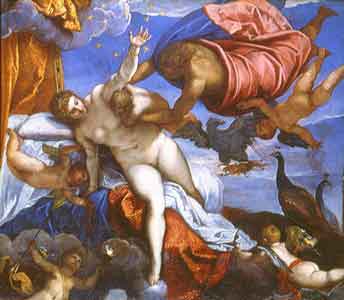|
|
Griechische Astronomie: Einige Fakten Herodotus, the Father of History, tells us that once upon a time--which time, as the modern computator shows us, was about the year 590 B.C. --a war had risen between the Lydians and the Medes and continued five years. "In these years the Medes often discomfited the Lydians and the Lydians often discomfited the Medes (and among other things they fought a battle by night); and yet they still carried on the war with equally balanced fortitude. In the sixth year a battle took place in which it happened, when the fight had begun, that suddenly the day became night. And this change of the day Thales, the Milesian, had foretold to the Ionians, laying down as a limit this very year in which the change took place. The Lydians, however, and the Medes, when they saw that it had become night instead of day, ceased from their fighting and were much more eager, both of them, that peace should be made between them." Astronomy in Greek Literature In the Odyssey, Calypso directs Odysseus, in accordance with Phoenician rules for navigating the Mediterranean, to keep the Great Bear "ever on the left as he traversed the deep" when sailing from the pillars of Hercules (Gibraltar) to Corfu. Yet such a course taken now would land the traveller in Africa. Odysseus is said in his voyage in springtime to have seen the Pleiades and Arcturus setting late, which seemed to early commentators a proof of Homer's inaccuracy. Likewise Homer, both in the Odyssey [1] (v. 272−5) and in the Iliad (xviii. 489), asserts that the Great Bear never set in those latitudes. Now it has been found that the precession of the equinoxes explains all these puzzles; shows that in springtime on the Mediterranean the Bear as just above the horizon, near the sea but not touching it, between 750 B.C. and 1000 B.C.; and fixes the date of the poems, thus confirming other evidence, and establishing Homer's character for accuracy. [1] (In Greek!) Plaeiadas t' esoronte kai opse duonta bootaen 'Arkton th' aen kai amaxan epiklaesin kaleousin, 'Ae t' autou strephetai kai t' Oriona dokeuei, Oin d'ammoros esti loetron Okeanoio. George Forbes, History of Astronomy.
Etymology (In Preparation)
Anomalistic month from anomalia deviation, roughness Aphelion from apo from and helios Sun Asteroid from astron (star) and -oid (like) Astronomy from astèr (star) and nomos law Chromosphere from chroma color; sphaira ball Comet from aster kometes long-haired star Eclipse literally means abandonment Ephemeris -from ephémeros, -on", daily. An almanac of the daily motions of the planets and stars. Galactic from gala milk Geocentric gaea Earth; kentron center, middle Geographic gaea Earth; graphein description Heliocentric from Helios Sun; kentron center, middle (Sun as its center) Horizon, horizontal from horizon boundary Meteor, meteorite from meteoros ( lifted up, floating in the air )
|
